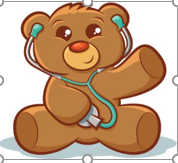- Reference Number: HEY1305/2022
- Departments:
- Last Updated: 31 May 2022
| A guide for patients, parents and corers |

Introduction
| This leaflet is designed to give you information about sedatives that may be given to your child prior to tests/investigations taking place. This is not meant to replace discussion between you and your nurse or doctor but can act as a starting point for such a discussion. If, after reading this leaflet you have further questions, please let the nurse/doctor know so that they can answer these.
During your visit to the hospital, your child may need to be sedated so that they are able to keep still in order to successfully perform necessary scans or tests. Sedation is generally performed for patients 3 years old and under. This can also be performed for older patients if you feel your child will not lay still for imaging. |
With support and preparation from the unit’s play specialist and a registered children’s nurse, many children cope well and so do not need sedation. Please bring with you some of your child’s favourite books, games, toys or DVDs.
What do you need to do if your child needs sedation?
| You should contact the hospital on the day before the test/scan to check what time your child will be having the sedation. This will allow you to make arrangements to arrive at the ward/department in plenty of time for the sedation to be given.
If your child is under 2 years old, they will need to be fasted of food/milk 4 hours prior to their scan time. They may drink clear fluids up to 2 hours before their scan. The sedation is given in medicine form by mouth and is called CHLORAL HYDRATE. If your child is over 2 years old, they will need to be given two different medicines: PROMETHAZINE and CHLORAL HYDRATE. Your child should be fasted of food/milk 4 hours prior to their scan time. They may drink clear fluids until they are given the first medication – which is normally given 1 hour 30 minutes before their scan. The timing of the medicines is important because it ensures that they have time to work properly. |
Please do not allow your child to sleep in the morning or until the sedation has been given.
What happens next?
| Once your child has been given the medicine, they must stay in the department/ward. Your child will gradually fall asleep, after which the nurse will take them to have the procedure performed. You are welcome to be with your child throughout the procedure.
After the scan, your child will return to the ward/department to recover from the procedure and the sedation. Some children take a little longer than other to recover after the sedation. It is important that you and your child stay until they have woken fully and has had something to drink so that we know that they are well enough to go. You could bring something with you that your child likes to eat or drink. The nurse will assess your child to ensure a full recovery has been made and will give you any additional information about care, future appointments, or tests. Your child should feel up to playing, eating and drinking normally once discharged home. If after getting home, you have any concerns, please contact the hospital on the numbers overleaf. Alternatively, contact the ward from which your child was discharged. |
Contact InformationPediatric Outpatient Department 01482 607872 Ward 130 West 01482 674463 Ward 120 01482 674455 |
This leaflet was adapted from a previous version by the Nuclear Medicine Department with advice from the Paediatric Department Hull University Teaching Hospitals NHS Trust
General Advice and Consent
Most of your questions should have been answered by this leaflet, but remember that this is only a starting point for discussion with the healthcare team.
Consent to treatment
Before any doctor, nurse or therapist examines or treats your child, they must seek your consent or permission. In order to make a decision, you need to have information from health professionals about the treatment or investigation which is being offered to your child. You should always ask them more questions if you do not understand or if you want more information.
The information you receive should be about your child’s condition, the alternatives available for your child, and whether it carries risks as well as the benefits. What is important is that your consent is genuine or valid. That means:
- you must be able to give your consent
- you must be given enough information to enable you to make a decision
- you must be acting under your own free will and not under the strong influence of another person
During the course of your child’s procedure the radiology staff will ask questions that may appear unnecessary to you and these may be repeated at certain intervals. Please be assured that these questions are necessary to ensure that all aspects of your child’s care during the procedure are maintained to a high standard.
Information about your child
We collect and use your child’s information to provide your child with care and treatment. As part of your child’s care, information about your child will be shared between members of a healthcare team, some of whom you may not meet. Your child’s information may also be used to help train staff, to check the quality of our care, to manage and plan the health service, and to help with research. Wherever possible we use anonymous data.
We may pass on relevant information to other health organisations that provide your child with care. All information is treated as strictly confidential and is not given to anyone who does not need it. If you have any concerns please ask your child’s doctor, or the person caring for your child.
Under the General Data Protection Regulation and the Data Protection Act 2018 we are responsible for maintaining the confidentiality of any information we hold about your child. For further information visit the following page: Confidential Information about You.
If you need information about your child’s (or a child you care for) health and wellbeing and their care and treatment in a different format, such as large print, braille or audio, due to disability, impairment or sensory loss, please advise a member of staff and this can be arranged.

